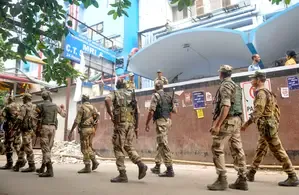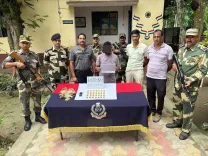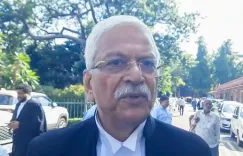Is the CISF Strengthening Its Training with the Army in Kashmir?

Synopsis
Key Takeaways
- CISF is partnering with the Indian Army for extensive training.
- Focus on high-pressure scenarios like drone incursions and terrorist attacks.
- Modules include night operations and jungle warfare.
- Only personnel under 35 and NSG standards will participate.
- Expansion of training to sensitive locations is planned.
Chandigarh, July 23 (NationPress) For the very first time, the Central Industrial Security Force (CISF) is implementing full-scale training sessions at elite Indian Army units in the Kashmir Valley. This marks a significant advancement in enhancing its operational preparedness amid evolving security threats, according to a senior official on Wednesday.
CISF Commander Lalit Pawar, whose unit is tasked with the security of civil secretariats in Punjab and Haryana in Chandigarh, emphasized that this focus on battle-readiness is essential for preparing personnel to promptly and effectively address crises at vital and high-risk sites such as airports, nuclear facilities, governmental buildings, and even Parliament.
The training prioritizes managing intricate, high-pressure situations like drone attacks, coordinated terrorist strikes, insider threats, and sabotage operations with agility, accuracy, and composure. Previously, only a select number of CISF personnel were permitted to participate in such exercises.
In light of close collaboration between the CISF and the Army, and recognizing the crucial national interest, the Army has consented to extend comprehensive training modules to larger groups. These modules entail night operations, jungle warfare, close-combat tactics, and endurance-building exercises.
According to him, these training modules are crafted to enhance CISF's already substantial expertise in urban counter-threat operations while further improving its capability to function in intricate terrains and high-threat zones.
The objective is to empower personnel to adeptly manage emergencies such as armed infiltrations, sabotage, and multi-faceted terror attacks in both urban and rural settings.
He mentioned that the personnel chosen for this high-intensity training belong to CISF's Quick Reaction Teams (QRTs), the primary responders to emergencies across all 369 units of the force.
Eligibility criteria include being under 35 years of age and passing the battle physical efficiency test in accordance with National Security Guard (NSG) standards.
Importantly, these QRT members have already undergone a rigorous six-month in-house training program with the CISF before participating in the Army module, he noted.
The CISF intends to broaden this advanced combat training approach to more units, commencing with the most sensitive and high-risk locations.
The goal is to progressively elevate all CISF personnel to a higher level of physical endurance, tactical skill, and psychological fortitude, ensuring the force is always ready to safeguard the nation's critical infrastructure from emerging threats. This is a remarkable initiative aimed at preparing the force to be 'battle-ready' against unconventional and hybrid threats.





